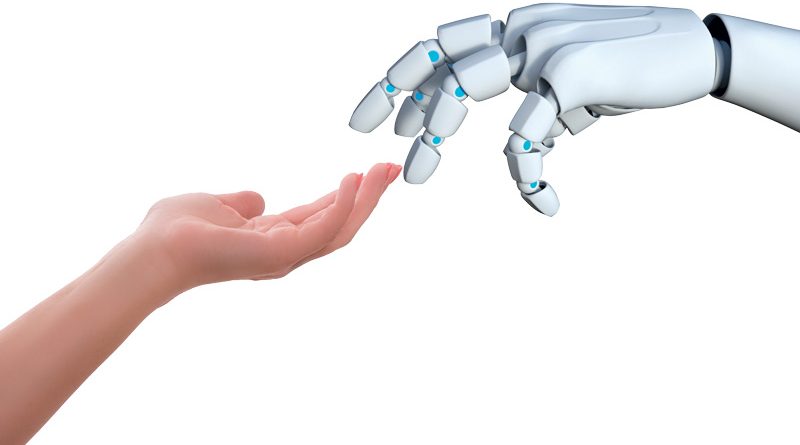Wealthy Factories, Thanks (also) to the Robots
According to the words of some entrepreneurs who employ robots every day in their factories, but also to the results of a survey conducted recently by Doxa, there seems to be a positive correlation between factory robotization and improvement of operators’ health conditions. SIRI, PubliTec and Fondazione UCIMU organized a conference on such an issue, allowing us to tackle the topic from several points of view.
by Leonardo Albino
Last November 7th, SIRI (the Italian Robotics and Automation Association), PubliTec and Fondazione UCIMU promoted a conference entitled “Robots, Health and Wellness. The impact of 4.0 industrial automation on the work into the factories” at the headquarters of UCIMU – Sistemi per produrre in Cinisello Balsamo (MI). The key objective of the conference was to identify the effects of the widespread factory robotization on the health and well-being of those who work inside the factories every day. In order to do this, four entrepreneurs working in manufacturing employing robots were involved. Furthermore, some experts in medicine, sociology, as well as researchers and other professionals gathered together to provide several interesting points of view.
To sum up, Antonio Bevacqua from San Grato High-Tech Forging (moulding, San Grato Canavese, TO), Raffaele Colleoni from Fonderie Mario Mazzucconi (fusion and metalworking, Ponte San Pietro, BG), Carlo Gai from Gai Macchine Imbottigliatrici based in Cappelli (CN) and Matteo Vailati from Intercos Group (cosmetics, Agrate Brianza, MB) stated that the robots installed in their production lines – from small collaborative robots to welding or handling robots with high payload – have given positive results in terms of throughput, employment growth and above all decrease in injuries at work. In some cases, the adverse events concerning the operators have practically disappeared due to the fact that the robots deal with the highest risk tasks.
The Doxa survey on the impact of automation at work
Doxa also studied the impact of robots and industrial automation at work. Massimo Sumberesi, Head of Doxa Marketing Advice, presented a survey conducted last spring on a sample of managers/entrepreneurs and a sample of employees. The results show a substantially favourable sentiment both among managers and entrepreneurs and among workers, with significant differences between those who work in a robotized environment and those who, instead, have no experience.
The contact with robots or artificial intelligence (AI) systems clearly highlights the positive aspects. It is also interesting to notice how the effects of automation on everyday work are considered in a more positive way among the operators (78%) than among the employees (60%) or the executives (66%). The evaluation, however, is definitely positive for both categories.
The widespread perception of safety improvement
“The survey – added Massimo Sumberesi – shows quite a positive balance between companies that have increased the number of employees and those who have seen it decline following the introduction of robots or AI systems. Furthermore, the companies that have invested in robotics generally state that they intend to continue also in the future”.
The framework, therefore, seems rather outlined and encouraging and can certainly contribute to overcoming some prejudices: only 16% of workers say they are against the use of robots, a share that falls below 10% among employees of already robotized companies. About 30% of companies operating in Italy use systems, solutions and processes based on the robots. Among these, almost 1/3 increased the number of employees, while just 5% said they had significantly reduced their staff. Over 70% of workers say they have noticed an improvement in safety conditions at work.
“The augmented worker” and his higher levels of satisfaction
Professor Massimo Pagani from the School of Specialization in Sports Medicine at the University of Milan faced such an issue talking about stress management. In his opinion, robots are not to be considered as “stressors”, that is to say stressful factors producing some given health effects, but rather as an opportunity to promote change with the aim of improving work conditions in terms of health and well-being.
Another academic, Professor Lino Codara, teaching Sociology of the Organizations at the University of Brescia, focused on the relationship between 4.0 industrial automation and quality of work, considering the close connection (even if not univocal) between quality of work and well-being.
“By making available to workers even more information and offering them rapid communication tools, modern technologies make it possible to rethink tasks, thus resizing low-level hierarchies (new forms of direct communication between workers and managers are now possible, skipping the middle management) and forms of horizontal coordination. Today we may talk about an “augmented worker”, that is a creative worker, also involved, responsible, able to manage data, solve problems and collaborate directly with the managers of the staff functions (logistics, maintenance, etc.). A worker that is, to sum up, capable of carrying out a smart work”.
Some field researches show that these workers actually declare the highest levels of satisfaction.

